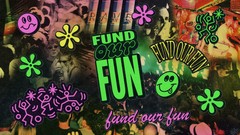'Fund Our Fun': A series celebrating the UK’s music and nightlife industries, and a rallying call to protect them.
Advertisement
My parents don’t have a picture of my wife and I on our wedding day in their hallway; it’s a framed shot of us onstage at Download. We’re there looking triumphant, fists up in victory, in one of those crowd-behind-the-band live album shots. My wife looks amazing. I look like an armpit holding a guitar. But it’s my favourite picture of us – it’s a shared achievement, a dream-come-true memory, our lives summed up in one sweaty, muddy photo.Emily, my wife, and I have been married for 13 years. The band has been going for one longer than that. When we get interviewed, people often ask what it’s like being in a band together, and it’s a hard question to answer because we don’t know anything else. What we do know is that there’s no leaving someone at home when you go off on tour or to the studio, or who feels like you’re ignoring them for band stuff. And that’s also the best bit.The other things we know are: what it’s like to have festival roads shut off by Metallica’s crew, resulting in an angry wife driving a Ford Fiesta full of gear through the arena to the stage. How to negotiate getting a towed car back in Leipzig. Danish squats are the boss level of hospitality. The best road food is hamburger crisps and Belgian petrol station chocolate milk. The country with the most challenging venue toilets is Romania. Wherever you are, interactions with the customs are improved by a guitar case and using the words “Black Sabbath”.
Advertisement
Doing this together makes it better. You don’t have to attempt to comprehend why something was the best night of their life or why it was exhausting and frustrating: you were there, you know. We both know the thrill of supporting your heroes in big venues, or which bit of the M6 has the best services (Tebay), just as we both know why back-to-back 3am bus calls, or two-hour gig overruns, are war crimes. You were there, dear, you know.This isn’t our livelihoods, and in some way that’s good. Spoiler alert: underground doom metal is not the get-rich quick scheme it may appear to be. That said, this pays for itself, and not relying on it means it’s beyond the world of tedious things like money. But we do rely on people who have made the arts their full-time jobs in order to keep doing it. Venue owners, sound engineers, promoters, label folk, festivals, guitar shops, producers – they’re the people who make it happen for part-time fun-seekers like us. They’re the ones who need protecting.In Europe, things are very different than they are here. Getting paid for a gig often comes with paperwork so that, through proper book-keeping, venues can get support from their city if they need it. We know a guy in Norway who gets a grant to bring in foreign bands and promote the town. Plenty of squat venues exist because the crusty bloke with the dog who runs it is, officially, the custodian of whatever old factory the venue is housed in, keeping it in a state of repair like Jack Torrence in an Amebix shirt. Word is that when rules about the sale of weed to foreigners in the Netherlands were tightened, special allowance was made for Roadburn on account of how much tourist money it brings to the city, spent by people who really, really like getting baked while they watch someone with antlers hitting a traditional drum with a laptop. These things are seen as community assets, rather than small-profit hellholes standing in the way of building yet more flats with nothing to actually do around them. And that’s what we’ll lose if the arts are allowed to die: something to do, something we love. The fun and friendship and banter of what goes on between gigs is just as vital and important as what happens onstage. This is where people can find their place in the world, and a way to actually live. After Brexit, with all the extra visas and fees and other needless bollocks those things entail for touring, these opportunities are going to dwindle, only for a chosen few.I don’t want to lose this. I want to keep driving around in a van with my wife and going to places thousands of miles from home where we don’t know anyone to play music and feel helpless from laughing and make weird and wonderful friends together. I genuinely can’t imagine our lives without being able to do this, and I don’t want to, and I know my parents’ hallway wouldn’t look as good with a photo of us suited up, ready for another productive day in cyber.@Nick_Ruskell
